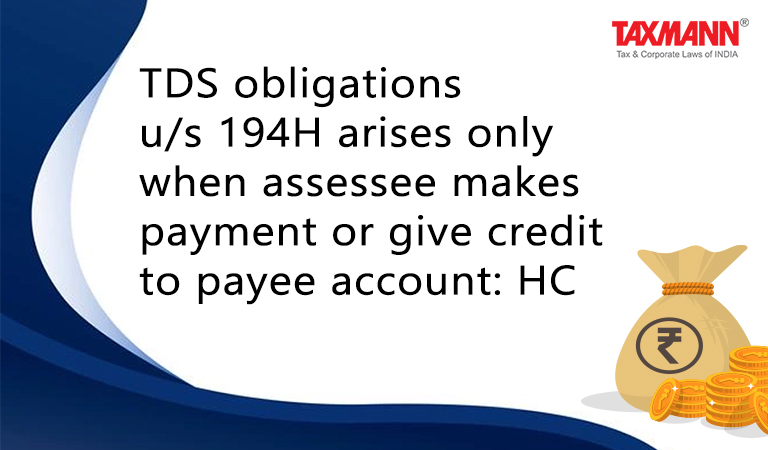TDS obligations u/s 194H arises only when assessee makes payment or give credit to payee account: HC
- Blog|News|Income Tax|
- 2 Min Read
- By Taxmann
- |
- Last Updated on 11 January, 2022

Case Details: CIT v. Super Religare Laboratories Ltd. - [2021] 133 taxmann.com 313 (Bombay)
Judiciary and Counsel Details
-
- K.R. Shriram and Amit B. Borkar, JJ.
-
Suresh Kumar for the Appellant. Ravi Sawana for the Respondent.
Facts of the Case
Assessee-company engaged in providing laboratory and testing services to customers through its own and third-party collection centres. Assessee allowed certain discounts to the collection centres other than its own centres.
For example, the collection centres would charge a patient Rs. 500 for a particular blood test and handing the sample drawn to the assessee and assessee would charge the collection centre Rs. 400. As per the Assessing Officer (AO), this difference of Rs. 100 was commission to paid collection centres, and the assessee had an obligation under section 194H to deduct TDS. AO treated as assessee-in-default and passed an order under sections 201(1) and 201(1A).
On appeal, the CIT(A) and the Tribunal reversed the order of AO. Aggrieved-revenue filed the instant appeal before the Bombay High Court.
High Court Held
The Bombay High Court held that section 194H casts an obligation on a person to deduct tax at source (TDS) only when such person is responsible for paying any income by way of commission or brokerage. Tax is deducted at the time of credit of such income to the payee’s account or at the time of payment of such income in cash or by the issue of a cheque or draft or by any other mode, whichever is earlier.
In the instant case, the assessee had not paid any money to the collection centres. It was only receiving payment from the collection centres. The collection centres collect money from the patient, pay a reduced amount to the assessee, and keep the difference as its margin.
It should be noted that the provisions of section 194H are applicable only when the assessee is making credit of an amount to the account of the payee or making payment of such amount to the payee.
Here, the assessee didn’t perform any act of such act. Thus, there was no obligation on the company to deduct tax at source. AO could not explain how the assessee should have deducted TDS and paid with the treasury when the assessee was not even making any payment.
Disclaimer: The content/information published on the website is only for general information of the user and shall not be construed as legal advice. While the Taxmann has exercised reasonable efforts to ensure the veracity of information/content published, Taxmann shall be under no liability in any manner whatsoever for incorrect information, if any.

Taxmann Publications has a dedicated in-house Research & Editorial Team. This team consists of a team of Chartered Accountants, Company Secretaries, and Lawyers. This team works under the guidance and supervision of editor-in-chief Mr Rakesh Bhargava.
The Research and Editorial Team is responsible for developing reliable and accurate content for the readers. The team follows the six-sigma approach to achieve the benchmark of zero error in its publications and research platforms. The team ensures that the following publication guidelines are thoroughly followed while developing the content:
- The statutory material is obtained only from the authorized and reliable sources
- All the latest developments in the judicial and legislative fields are covered
- Prepare the analytical write-ups on current, controversial, and important issues to help the readers to understand the concept and its implications
- Every content published by Taxmann is complete, accurate and lucid
- All evidence-based statements are supported with proper reference to Section, Circular No., Notification No. or citations
- The golden rules of grammar, style and consistency are thoroughly followed
- Font and size that’s easy to read and remain consistent across all imprint and digital publications are applied



 CA | CS | CMA
CA | CS | CMA
